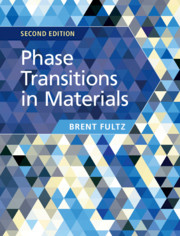Book contents
- Frontmatter
- Contents
- Preface
- Notation
- Part I Basic Thermodynamics and Kinetics of Phase Transformations
- Part II The Atomic Origins of Thermodynamics and Kinetics
- 6 Energy
- 7 Entropy
- 8 Pressure
- 9 Interactions in Microstructures and Constrained Equilibrium
- 10 Atom Movements with the Vacancy Mechanism
- Part III Types of Phase Transformations
- Further Reading
- References
- Index
6 - Energy
from Part II - The Atomic Origins of Thermodynamics and Kinetics
Published online by Cambridge University Press: 24 April 2020
- Frontmatter
- Contents
- Preface
- Notation
- Part I Basic Thermodynamics and Kinetics of Phase Transformations
- Part II The Atomic Origins of Thermodynamics and Kinetics
- 6 Energy
- 7 Entropy
- 8 Pressure
- 9 Interactions in Microstructures and Constrained Equilibrium
- 10 Atom Movements with the Vacancy Mechanism
- Part III Types of Phase Transformations
- Further Reading
- References
- Index
Summary
Chapter 6 covers the internal energy E, which is the first term in the free energy, F = E – TS. The internal energy originates from the quantum mechanics of chemical bonds between atoms. The bond between two atoms in a diatomic molecule is developed first to illustrate concepts of bonding, antibonding, electronegativity, covalency, and ionicity. The translational symmetry of crystals brings a new quantum number, k, for delocalized electrons. This k-vector is used to explain the concept of energy bands by extending the ideas of molecular bonding and antibonding to electron states spread over many atoms. An even simpler model of a gas of free electrons is also developed for electrons in metals. Fermi surfaces of metals are described. The strength of bonding depends on the distance between atoms. The interatomic potential of a chemical bond gives rise to elastic constants that characterize how a bulk material responds to small deformations. Chapter 6 ends with a discussion of the elastic energy generated when a particle of a new phase forms inside a parent phase, and the two phases differ in specific volume.
Keywords
- Type
- Chapter
- Information
- Phase Transitions in Materials , pp. 133 - 170Publisher: Cambridge University PressPrint publication year: 2020

